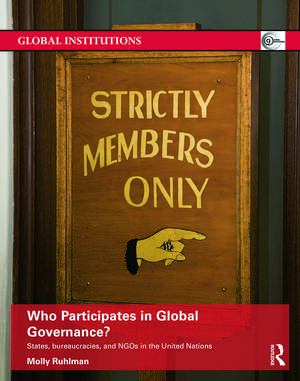Who Participates in Global Governance?: States, bureaucracies, and NGOs in the United Nations: Global Institutions
Autor Molly Ruhlmanen Limba Engleză Hardback – 18 aug 2014
This book demonstrates that NSAs have long been participants in global governance institutions, and that states and bureaucracies have not always resisted their inclusion. At the same time, this study encourages skepticism of the assumption that increasing participation should be expected with the passage of time. The result is a study that challenges some commonly held assumptions about the interests of IOs and states, while providing an interesting comparison of secretariat and state interests with regard to one particular aspect of IO institutional rule and practice: the participation of non-state actors.
Addressing the regular assumption that the power of states and the efficacy of multilateral governance have simply wilted in the heat of globalization while NSAs have flourished, this work features analysis of key institutions such as UNCEF, UNDP and the Environment Programme. It will be of great interest to students and scholars of international relations, the United Nations, and NGOs.
Din seria Global Institutions
-
 Preț: 286.42 lei
Preț: 286.42 lei -
 Preț: 329.60 lei
Preț: 329.60 lei -
 Preț: 303.16 lei
Preț: 303.16 lei -
 Preț: 279.80 lei
Preț: 279.80 lei -
 Preț: 279.88 lei
Preț: 279.88 lei -
 Preț: 309.04 lei
Preț: 309.04 lei -
 Preț: 326.01 lei
Preț: 326.01 lei -
 Preț: 271.46 lei
Preț: 271.46 lei -
 Preț: 310.65 lei
Preț: 310.65 lei -
 Preț: 301.39 lei
Preț: 301.39 lei -
 Preț: 295.35 lei
Preț: 295.35 lei -
 Preț: 365.03 lei
Preț: 365.03 lei -
 Preț: 299.26 lei
Preț: 299.26 lei -
 Preț: 326.36 lei
Preț: 326.36 lei -
 Preț: 356.45 lei
Preț: 356.45 lei -
 Preț: 188.79 lei
Preț: 188.79 lei -
 Preț: 345.89 lei
Preț: 345.89 lei -
 Preț: 363.25 lei
Preț: 363.25 lei -
 Preț: 363.20 lei
Preț: 363.20 lei - 18%
 Preț: 1001.55 lei
Preț: 1001.55 lei - 26%
 Preț: 761.76 lei
Preț: 761.76 lei - 18%
 Preț: 999.82 lei
Preț: 999.82 lei -
 Preț: 447.90 lei
Preț: 447.90 lei -
 Preț: 384.16 lei
Preț: 384.16 lei -
 Preț: 440.69 lei
Preț: 440.69 lei -
 Preț: 369.18 lei
Preț: 369.18 lei -
 Preț: 368.90 lei
Preț: 368.90 lei -
 Preț: 345.89 lei
Preț: 345.89 lei -
 Preț: 360.10 lei
Preț: 360.10 lei - 18%
 Preț: 998.71 lei
Preț: 998.71 lei - 18%
 Preț: 1113.25 lei
Preț: 1113.25 lei -
 Preț: 358.84 lei
Preț: 358.84 lei - 17%
 Preț: 246.93 lei
Preț: 246.93 lei - 18%
 Preț: 1160.47 lei
Preț: 1160.47 lei - 18%
 Preț: 1052.38 lei
Preț: 1052.38 lei -
 Preț: 381.03 lei
Preț: 381.03 lei -
 Preț: 364.51 lei
Preț: 364.51 lei - 26%
 Preț: 819.48 lei
Preț: 819.48 lei - 18%
 Preț: 1111.51 lei
Preț: 1111.51 lei - 18%
 Preț: 999.46 lei
Preț: 999.46 lei
Preț: 696.82 lei
Preț vechi: 849.79 lei
-18% Nou
Puncte Express: 1045
Preț estimativ în valută:
133.34€ • 139.57$ • 110.98£
133.34€ • 139.57$ • 110.98£
Carte tipărită la comandă
Livrare economică 01-15 aprilie
Preluare comenzi: 021 569.72.76
Specificații
ISBN-13: 9780415733045
ISBN-10: 0415733049
Pagini: 200
Ilustrații: 3 black & white tables, 2 black & white line drawings
Dimensiuni: 138 x 216 x 15 mm
Greutate: 0.34 kg
Ediția:1
Editura: Taylor & Francis
Colecția Routledge
Seria Global Institutions
Locul publicării:Oxford, United Kingdom
ISBN-10: 0415733049
Pagini: 200
Ilustrații: 3 black & white tables, 2 black & white line drawings
Dimensiuni: 138 x 216 x 15 mm
Greutate: 0.34 kg
Ediția:1
Editura: Taylor & Francis
Colecția Routledge
Seria Global Institutions
Locul publicării:Oxford, United Kingdom
Public țintă
Postgraduate and UndergraduateCuprins
Introduction, 1. Who participates, and who decides? International organizations as complex actors, 2. Mobilizing public opinion: NGOs and the United Nations, 3. Non-state actors and UNICEF, 4. Non-state actors and the UN Development Programme, 5. Non-state actors and the UN Environment Programme, 6. Interests and participation in multilateralism: seeking innovation amidst stubborn interests
Recenzii
This work is part of Routledge’s impressive "Global Institutions" series. Ruhlman (Towson Univ.) examines the role of non-state actors (NSAs) within international organizations. Because the constituent, dues-paying members of international organizations are generally nation-states, readers might question whether NSAs play any meaningful role within them at all, although some observers see a declining role for traditional nation-states. --M. F. Farrell, Ripon College
Descriere
Challenging the regular assumption that the power of states and the efficacy of multilateral governance have simply wilted in the heat of globalization while NSAs have flourished, this work features analysis of key institutions such as UNCEF, UNDP and the Environment Programme. It will be of great interest to students and scholars of international relations, the United Nations, and NGOs.
